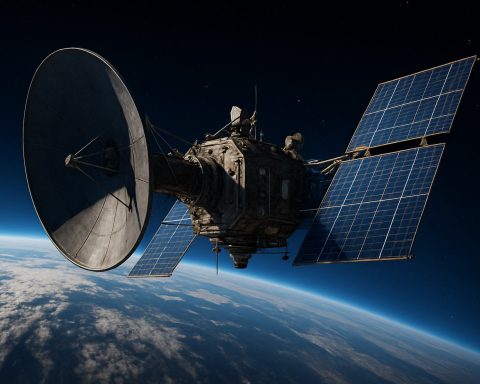- The rise of drones in New Jersey is driving transformative changes across sectors like agriculture, emergency response, and delivery services.
- Legislative measures are supporting drone advancement while safeguarding privacy, attracting tech startups to address urban and rural challenges.
- Drones play a crucial role in emergency response, offering real-time crisis assessment that enhances decision-making and potentially saves lives.
- In agriculture, drones aid sustainable farming by optimizing pest control and resource distribution, leading to higher crop yields.
- The transportation sector foresees drone integration in logistics, pointing to a future with common drone deliveries despite challenges like airspace management.
The horizon of New Jersey is not only a scenic wonder; it’s fast becoming a canvas of technological transformation. Drones are taking flight across the Garden State, promising revolutionary changes across diverse sectors like agriculture, emergency response, and delivery services. As these flying gadgets gather momentum, New Jersey seems set to lead a new industrial revolution right in its airspace.
Innovation Meets Legislation: Recent legislative initiatives aim to propel drone technology forward, laying the groundwork for innovation while upholding privacy safeguards. These laws are attracting tech startups eager to harness drones for solving both urban complexities and rural issues.
Essential for Emergencies: Drones are now integral to New Jersey’s emergency response strategy. Their swift, overhead vantage point allows first responders to assess crises in real-time, enabling quicker, smarter decision-making that could potentially save lives.
Agricultural Upheaval: In farming, drones are pivotal. With their precise monitoring capabilities, they help farmers optimize pest control and resource distribution, promising better crop yields and a reduced environmental footprint—a boon for sustainable agriculture.
Eyes on the Future: The scope of drones doesn’t end here. The transportation sector anticipates a groundbreaking shift with the integration of drones into logistics systems, hinting at a future where drone deliveries become commonplace. Despite hurdles like airspace management and privacy fears, the momentum here is unmistakable.
New Jersey’s aerial innovation could soon see its skies teeming with flying tech, fostering growth while setting trends for the rest of the nation. As drones take to the skies, residents and businesses alike might witness a new era where technological advancement literally unfolds above their heads.
This Innovation is Taking Over New Jersey Skies: What You Need to Know!
Revolutionizing New Jersey: The Drone Phenomenon
New Jersey’s skyline is more than just a scenic view—it’s an evolving technological canvas illustrating a drone-driven revolution. This article will delve into the intricacies of how drone technology is reshaping critical industries across the state, highlighting strategies, impacts, and the future trajectory of this dynamic change.
Key Innovations and Future Prospects
1. Drone Legislation: Balancing Innovation and Privacy
Recent legislative efforts in New Jersey are paving the way for significant advancements in drone technology. By forging laws that balance innovation with privacy concerns, the state is becoming a magnet for tech startups focusing on both urban and rural challenges. This legislative approach is drawing entrepreneurs keen on deploying drones for solutions ranging from traffic management to agribusiness applications.
2. Enhanced Emergency Response
Drones are becoming essential to emergency operations in New Jersey, offering an aerial perspective that is invaluable for real-time crisis assessment. This swift and comprehensive viewpoint allows for quicker and more informed decision-making, directly contributing to potentially life-saving outcomes. The integration of drones in emergency protocols is expected to enhance response times further and improve coordination among first responders.
3. Transforming Agriculture
In New Jersey’s agricultural sectors, drones are at the forefront of innovation. They provide farmers with precise monitoring capabilities, enhancing pest control measures and resource allocation. This technological aid not only helps boost crop yields but also supports sustainable farming practices by reducing environmental impacts. As drones become more prevalent, the agricultural landscape is expected to undergo a significant transformation, promoting efficiency and sustainability.
Important Questions Explored
Q1: How is drone legislation in New Jersey fostering innovation while safeguarding privacy?
New Jersey’s legislative landscape focuses on creating an environment conducive to technological growth without compromising privacy. By instituting clear guidelines for drone operation and data collection, the state attracts tech startups interested in addressing urban and rural challenges using drone technology. This approach ensures privacy concerns are addressed while encouraging innovation.
Q2: What role do drones play in enhancing emergency response efforts?
Drones play a crucial role in emergency response by providing an aerial viewpoint that facilitates real-time crisis analysis. This capability enables first responders to make faster and more accurate decisions, ultimately improving response times and coordination efforts. Their integration into emergency strategies significantly enhances overall crisis management.
Q3: How are drones transforming the agricultural sector in New Jersey?
Drones are revolutionizing agriculture in New Jersey by offering precise monitoring that optimizes pest control and resource use. This not only leads to higher crop yields but also promotes sustainable practices by minimizing environmental damage. As drones become a staple in farming, they are expected to drive efficiency and sustainability significantly.
Future Implications and Broader Impact
The continued integration of drones into New Jersey’s infrastructure signals far-reaching implications, especially as drone deliveries and logistic systems gain traction. Despite ongoing challenges like airspace management and privacy issues, the momentum driving this technological shift is unmistakable.
For more exciting developments, explore information about drone innovations and legislation trends at FAA or dive into agricultural drone technology insights at USDA.













